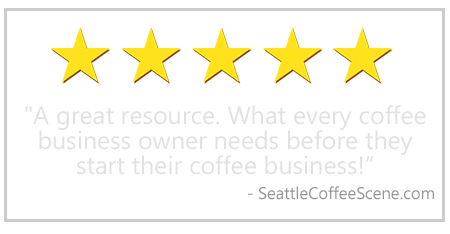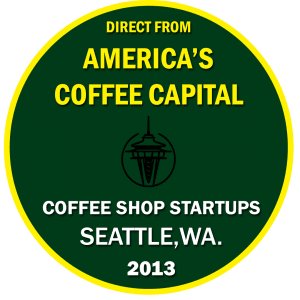How to Open a Coffee and Wine Bar
How to Open a Coffee and Wine Bar

Coffee & Wine Bar Business
How to Open a Coffee and Wine Bar
Opening a coffee and wine bar is an exciting prospect. A coffee and wine bar provides a great business opportunity for those who want to combine their love for coffee and passion for serving great wine.
A coffee and wine bar startup is an excellent way to attract a wide variety of customers throughout the day – increasing service hours from morning till night – and having two core profit streams.
With over 200 million Americans drinking coffee daily and roughly 75% of American adults drinking wine, there has never been a better time to open a coffee and wine bar.
What is a Coffee and Wine Bar?
A coffee and wine bar is a retail food and beverage establishment that sells both coffee and wine. It caters to both coffee and wine customers. It is generally not thought of as a bar. However, due to differing regulations regarding the wine and beer permits in different counties and states, a coffee and wine bar may need to provide a more extensive menu than a coffee shop.
In today's post, we will talk about how to open a coffee and wine bar and what steps you need to take to get your planning off the ground.
![]() ‘
‘
How to Open a Coffee and Wine Bar
Below, we'll outline clear steps on how to start a coffee and wine bar. Then, depending on your location, specific vision, and budget, you can amend the suggestions and work on what suits you.
1. Decide on Your Concept (Get Specific)
A coffee and wine bar is a specific business concept that centers itself on selling coffee and wine. First, however, we want you to dive a little deeper into the details.
What type of business coffee and wine bar will you want to be? For example, some cafés serve wine and beer in addition to their coffee. Others only serve wine at night while providing coffee all day long. Answer the following questions:
- Will your coffee and wine bar serve a deep menu offered by a full kitchen?
- Is serving coffee and wine from specific regions on the menu?
- Will you provide light snacks and hors d'oeuvres with live music?
- What will be the topic that binds coffee and wine at your business?
Your concept should be squarely focused on appealing to your target market, which we will discuss next.
2. Focus on Your Target Market
Your coffee and wine bar target market will be your ideal customers who will be attracted to your offerings and pricing.
The development of your business concept, coffee and wine menu, your messaging, and location choice – will all come from your assessment of your target market.
A coffee and wine bar isn't like your typical coffee shop. The “wine and coffee bar concept” generally leans towards the higher-end clientele.
Consider researching potential areas where there is a higher propensity of your target market. To start with, you can reach out to your local chamber of commerce for local information. Get available real-estate data, income level information, and other vital demographics that would tend to hold your target customer.
Understand who your customers will be, where they shop, what they eat, and what they value. And then develop your coffee and wine bar around them.
3. Determine Your Coffee and Wine Bar Menu
 While your coffee and wine will be the pillars of your product offering, you will probably want to offer a variety of food menu items.
While your coffee and wine will be the pillars of your product offering, you will probably want to offer a variety of food menu items.
What type of food items will you offer?
Some options include:
- Full-kitchen menu (lunch and dinner)
- Light snacks (appetizers and hors d'oeuvres)
- Vegan, Kosher, or ethnic dishes
- Pastries, cakes, and tarts
- Soups and sandwiches
The possibilities are limitless when it comes to your coffee and wine bar menu. Just as important as your menu is exactly how you will serve your menu and your price points. For example, will your coffee and wine bar offer a full-table service? What price points will you provide for your menu items? Your prices on your menu will either appeal to your target market – or fall flat.
Your menu is the lynchpin of your entire coffee and wine operation (in addition to your wine or coffee). Finally, your menu will determine your coffee equipment choices, marketing, branding, hiring decisions, space requirements, and other elements – all important to your first planning stages.
Further Reading: Great Coffee Shop Concepts and Ideas to Consider
How to Open a Coffee and Wine Bar
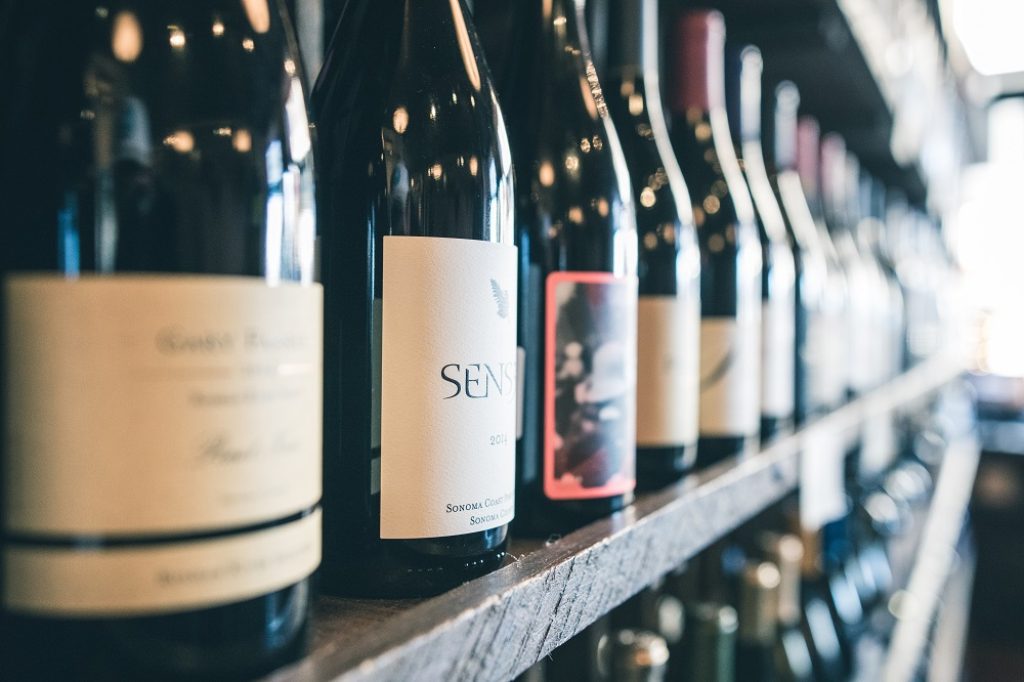
A Look a Coffee and Wine Bars
Write a Coffee and Wine Bar Business Plan
Now that you have settled on your coffee and wine bar concept, you've determined your target market and your menu – it's time to put it all together in a business plan.
Your coffee and wine bar business plan will be the map to your final destination: opening a coffee and wine bar successfully.
Writing your business plan will help you iron out the details in a precise and methodical way. In addition to articulating your vision, your business plan will be necessary to help you get the funding required, entice potential partners, and investors, and appeal to your property manager.
Your business plan will articulate your:
- Concept and vision
- Define your management & team
- Detail your operations
- Discuss your target market
- Menu details
- Budgeting
- Financial projections
- Competitor analysis
- Timeline and benchmarks
- Branding and marketing
- Exit strategy
For more information on writing your business plan, please read, How to Start Your Coffee Shop Business Plan.
Determine Your Budget
An essential part of your coffee and wine bar planning is to determine your budget. There are two central budgets when you start your coffee and wine bar. The first is your coffee shop startup budget. Your startup budget should include everything necessary to get your coffee and wine bar operational.
Your coffee and wine bar startup budget includes the following:
- Research and planning costs
- Legal and Administrative
- Consulting costs
- Equipment costs
- Permit and licenses
- Leasing
- Build out costs
- Training
- Branding, marketing, and promotion costs
- Labor costs
- Security deposits
Depending on your coffee and wine bar concept, you'll have other startup costs too, but these listed items should give you a generally good idea of what they consist of. Next will be your operational costs (otherwise known as overhead costs).
This operational budget includes the following costs:
- Monthly rent
- Inventory costs
- Utilities
- Insurance premiums
- Hourly labor costs and salaries
- Marketing
- Various fees
- Occasional costs (license renewals, maintenance, training)
Like the previous example, these operational cost examples should give you a good idea of what to expect per month.
Developing a startup's and operational budgets will be essential to your planning. But it's also important to note that you probably won’t be profitable in the first few months to a year. So, you will need an adequate cash flow to sustain your operation until you reach profitability.
For more information on sample costs, please read our post, How Much Does a Coffee Shop Cost?
Focus on Customer Experience
The chances are that your coffee and wine bar will ultimately appeal to premium clients, though you will have to envision what type of customer experience they will want to have.
The experience your customers have entails everything from your ambiance, seating, and table options, music, interior and exterior seating, lighting, cafe design – and all other sensory possibilities.
Your customer experience may begin even before they enter your wine and coffee bar. For example, can they park and easily access your entrance or have a valet parking option? What will your outdoor signage look like, and how good is your online representation?
Look for Your Location
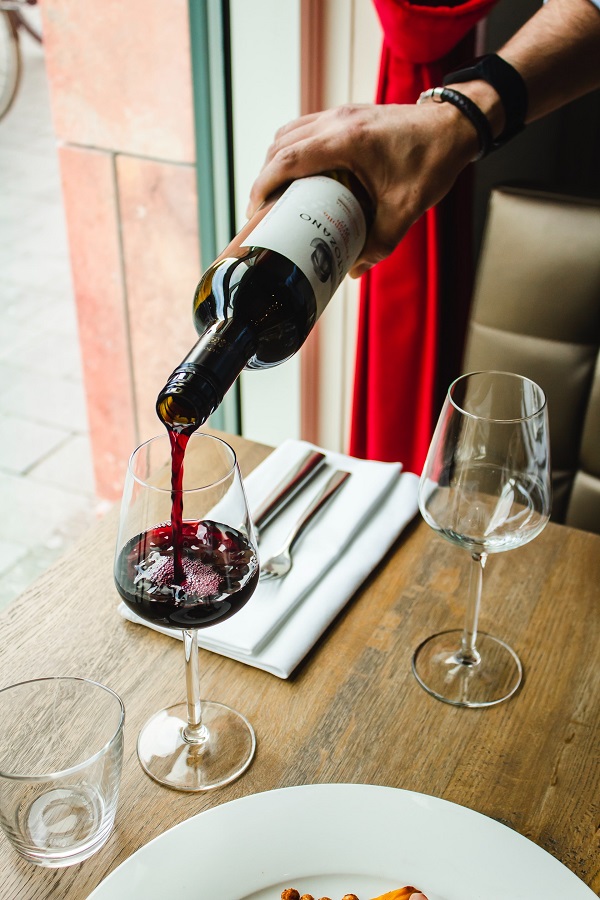 You will look for your physical location since you have settled on a target market and better understand your startup and operational budgets.
You will look for your physical location since you have settled on a target market and better understand your startup and operational budgets.
Depending on where you live or plan to operate your coffee and wine bar, you may have to start your search early. Additionally, you may also need professional help from a commercial real estate broker.
Searching for the perfect location for your café will have to include a variety of essential factors.
These location factors include:
- Accessibility
- Sizeable market base
- Geographically convenient for your target market
- Proper zoning
- Available leasing opportunities
- Existing competition
- Taxes and regulations
- Your budget
For more information on choosing the right location, please read How to Pick The Right Location for Your Coffee Shop.
Choose Your Equipment
Choosing your coffee and wine bar equipment will ultimately depend on your coffee and wine bar menu.
If you offer a full-kitchen or straightforward coffee and wine bar concept, you may or may not need separate kitchen and coffee equipment.
There will be some staple coffee equipment choices that you will need to make. These include choosing a commercial espresso machine, coffee grinders, blenders, refrigerators, ice machines, and other items. Other items include display cases, shelving, and storage.
Please read our post, Coffee Shop Equipment You Need, to look at coffee and wine bar equipment options more in-depth.
Competitor Analysis
It's essential to analyze the entire market area, including looking at your competitors. For example, with a coffee and wine bar, you may have two very different types of direct competitors: coffee shops and bars.
Before looking at your competitors, I like to advise clients to look at your wine and coffee bar's strengths. What is your Unique Selling Proposition? That is, what's going to make the coffee and wine bar special?
From there, you can then analyze the local competition. These may include bars and independent or chain coffee shops. Understand that customers buying coffee at a fast-food restaurant or gas station are not your target customer base.
Determine who your competitors are and figure out why their customers are buying from them. What are they offering on their menu or customer experience that is appealing? How can you leverage your actions to compete with them fairly? For more information, please read our post, How to Beat the Coffee Shop Competition?
Research Your Permits and Licenses
Now that you've decided on your location, you will want to research the various local government agencies you will need to work with. Each government agency will have a focus issue their license and permits.
For starters, you will have to register your business structure. Many coffee shops, cafes, bars, and restaurants often establish their businesses as LLCs. Coffee shop LLCs offer benefits that you should determine before you move forward with applying for other permits and licenses.
Next, you will want to research regulations required by your local health department. Your health department's job is to ensure your business protects your customers from foodborne illnesses.
Next, you will want to visit your building's department, which will need to inspect your facility for safety and occupancy regulations. Additionally, you will need to apply for a beer and wine license from the agency in your state or county that issues these particular permits.
Further Reading: Should You Serve Alcohol at Your Coffee Shop?
Steps To Open a Coffee and Wine Bar

A Look a Coffee and Wine Bar Businesses
Look For Your Wine & Coffee Vendors
When you start a coffee and wine bar, you will have vendors that make everything run smoothly. They are silent partners that ensure you have the necessary ingredients to sell your goods in many respects. Let's quickly mention the two important ones:
Coffee Beans Supplier
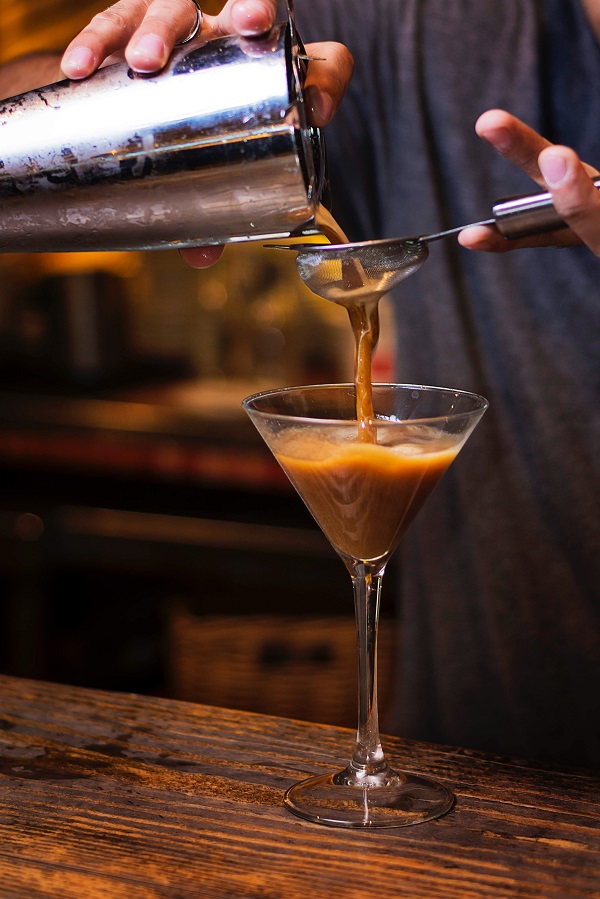 Running a coffee and wine bar requires coffee. Don't just get any coffee – get the best you can get your hands on. Your upscale clientele will want the best coffee beans. While you may decide to roast your own coffee beans, you will probably seek a wholesale coffee roaster.
Running a coffee and wine bar requires coffee. Don't just get any coffee – get the best you can get your hands on. Your upscale clientele will want the best coffee beans. While you may decide to roast your own coffee beans, you will probably seek a wholesale coffee roaster.
A wholesale coffee roaster will be able to provide you with the type of coffee beans you are looking for – in the quantity you need.
For more information on picking the right coffee roaster, consider reading How to Choose a Wholesale Coffee Roaster.
Wine & Beer Distributor
Serving your wine, you can go to the wholesale wine store. In addition, there are several top restaurant B2B stores where wine, beer, and alcohol are stored. You may also set up an account directly through wine and beer distributors, who may also be able to drop off your inventory.
Kitchen Supplies
If you intend to offer a more extensive menu, you will determine which vendors will provide the best ingredients to build your menu. This could mean anything from delivering your eggs, milk, meat, and seasoning to your flour, grains, and oil. Of course, you may decide to buy your pastries and desserts wholesale, too.
Get your coffee and wine bar menu and determine how you intend to get all the necessary items on your menu, who to shop with, or which wholesale accounts you need to open.
Design Your Coffee and Wine Bar Space
Chances are, the location you choose will need to undergo some remodeling. However, if your space was previously built for a similar coffee shop or wine bar, you may only need minimal buildout.
However, you may need some major remodeling and require professional assistance from an architect, designer, and contractor. At the very least, you must hire carpenters, painters, plumbers, and electricians.
While you could do much of the work yourself, your plumbing and electrical systems will have to be installed by certified contractors.
Nevertheless, you want to design your cafe space with your customer's experience in mind.
Your Coffee and Wine Bar Brand
If you haven't already done so, you will want to decide on a business name for your coffee and wine bar.
Choosing your coffee and wine bar name is essential in defining and building your brand. Everything from your logo, menu, colors, aesthetics, and messaging works to build your brand.
Your customers will gravitate towards your brand in the face of stiff competition or market noise. Your logo and brand will ultimately help you develop trust among your customers.
Hire Amazing Staff
A coffee and wine bar will need a mix of talented, reliable, and customer-friendly staff to succeed. That is, your hiring choices will ultimately impact the success of your business.
Hiring great staff will help you reach your profitability goals and create goodwill between you and your customers. Honest and reliable staff are a godsend that deserves to be valued.
Delivering value includes training staff, paying them well, creating a gratuity system that works for everyone, and providing them with other essentials: flexibility, medical, dental, and paid vacations. Because you will be serving alcohol, you’ll have to look at hiring staff members that are a little older than if you were just selling coffee. Be sure to check your local hiring laws to determine your hiring practices.
For more information, please read How to Hire the Best Baristas for your Coffee Shop.
Market and Promote Your Coffee and Wine Bar
Before you open your doors, you will want to begin promoting your wine and coffee bar. At first, it can be as simple as posting a sign or banner above your doors announcing that you will be opening soon.
Additionally, you will want to create a marketing plan that incorporates your brand, helps to define you, and reaches your target market.
Marketing and promoting would entail:
- Interior signs
- Exterior signs
- A-frame signs
- Website
- Social media
- Outreach to local media and bloggers
- Paid advertising
For more information, please read our post How to Promote and Market Your Coffee Shop.
Conclusion
We have covered the first steps to opening a coffee and wine bar. As you can see, you will need comprehensive planning. You can do several things to start your coffee and wine bar before spending any real money.
Additionally, because of the nature of the business, it will require a different level of knowledge from your average coffee shop startup.
The first is deciding on a concept, figuring out your menu, developing a budget, and putting it all down in a well-thought business plan.
We encourage you to get the further help you need by exploring our coffee shop business blog – and reading other trending articles that will help you pique your interest.
Trending Articles on Coffee Shop Startups:
| Coffee Shop Ideas & Concepts | Coffee Shop Budget and Planning |
|---|---|
| 50 Coffee Shop Ideas & Concepts | 7 Ways to Open a Coffee Shop with No Money |
| Low-Cost Coffee Shop Ideas | Open a Coffee Shop Bookstore |
| How to Open a Drive-Thru Coffee Stand | How Much do Coffee Shop Owners Make? |
![]()
Coffee and Wine Bars
How to Open a Coffee and Wine Bar
Additional Questions:
Should you serve alcohol at your café?
A coffee and wine bar, by its nature, serves alcohol. This may pose a dilemma for some coffee shop owners who are unsure whether they should opt for this business concept. Indeed, coffee and wine bars are not necessarily kid-friendly businesses but can be family-friendly. In addition, serving alcohol at your coffee shop has advantages – from higher margins, to more sales, and greater hours of operation. However, this may also come with other issues that you will need to consider.
Please read our post, The Pros and Cons of Serving Alcohol at Your Coffee Shop, for more information.
How much does a coffee and wine bar cost?
A coffee and wine bar costs depend entirely on the size, location, and concept. Determining your startup costs will depend on where you plan to open (a large city, small town), the condition of the space (significant buildout), and labor costs. Other than those variables, you will have fixed costs such as coffee equipment, kitchen equipment, legal and administrative fees, etc.
The average cost is $150,000 to $350,000. However, the costs of adding a wine bar to an existing coffee shop may come in the form of additional inventory. Dozens of wine bottles may need to be on hand and purchased on a weekly basis. Additionally, a more extended menu may need to be added due to some liquor licensing agency regulations.
Consider reading our post, How Much Does a Coffee Shop Cost?
How much money can I make as a coffee shop owner?
Your coffee and wine bar can be profitable. This is because the margins on both coffee and wine are very high in general. However, if you are wondering just how much money you can make as a coffee and wine bar owner, the answer is simply this:
It depends.
The amount of income you make as a coffee and wine owner depends on several important factors. These include your number of sales, your average receipt price, and your overhead costs.
For more information, please read our post, How Much Does a Coffee Shop Owner Make?
![]()
Are You Ready To Get Started?
Unlock Your Dream Coffee Shop Business with Our Exclusive Coffee Shop Startups Kit!
Ready to transform your passion for coffee into a thriving business? Look no further! Our Coffee Shop Startups Kit is your key to brewing success. Here's why you can't miss this opportunity:
![]() 35-Lecture Coffee Shop Business Course: Our kit provides a comprehensive A-to-Z lecture series that covers what you should know and how to plan your coffee business. No more guesswork – follow our proven roadmap for success.
35-Lecture Coffee Shop Business Course: Our kit provides a comprehensive A-to-Z lecture series that covers what you should know and how to plan your coffee business. No more guesswork – follow our proven roadmap for success.
![]() Comprehensive Coffee Shop Business Guide: Our kit includes a detailed, step-by-step guide that takes you from creating your concept to your grand opening.
Comprehensive Coffee Shop Business Guide: Our kit includes a detailed, step-by-step guide that takes you from creating your concept to your grand opening.
![]() Expert Interviews and Insights: Benefit from insider tips and industry secrets that successful coffee shop owners and experts share during one-on-one interviews. Learn from the best to stay ahead of the competition.
Expert Interviews and Insights: Benefit from insider tips and industry secrets that successful coffee shop owners and experts share during one-on-one interviews. Learn from the best to stay ahead of the competition.
![]() Business Essentials: We provide business plan templates, checklists, and resources to streamline your startup process. From permits to menu planning, we've got you covered.
Business Essentials: We provide business plan templates, checklists, and resources to streamline your startup process. From permits to menu planning, we've got you covered.
![]() Cost-effective Solutions: Save time and money with our expert advice and budgeting tips. Maximize your ROI and minimize headaches.
Cost-effective Solutions: Save time and money with our expert advice and budgeting tips. Maximize your ROI and minimize headaches.
![]() Adaptable to Any Setting: Our kit is designed to suit various locations and customer demographics, whether you're eyeing a trendy urban spot or a cozy corner in a suburban neighborhood.
Adaptable to Any Setting: Our kit is designed to suit various locations and customer demographics, whether you're eyeing a trendy urban spot or a cozy corner in a suburban neighborhood.
Includes Exclusive BONUS Material!
👉 Order Now and Begin Your Journey!
Don't let the complexities of starting a coffee shop overwhelm you. Our Coffee Shop Startups Kit is your ticket to entrepreneurial success. Take the first step towards owning a profitable and fulfilling coffee business today.
Join the thousands of successful coffee entrepreneurs who started with a dream and a great plan. Your journey to coffee shop greatness begins right here!
Comprehensive. Proven. Affordable.
The Complete Coffee Shop Startup Kit
(Instantly Delivered To You)
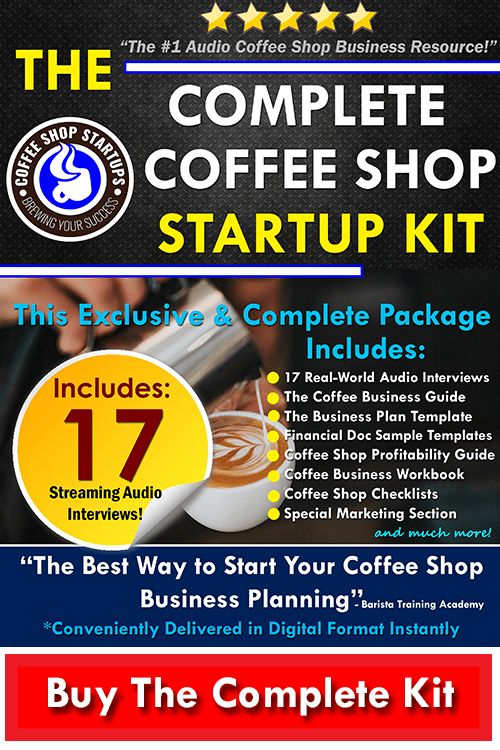
* The information on this page is for educational purposes only. We do not offer legal advice.

